Module 2 Traffic Jam Revision& Grammar 课件(27张PPT)
文档属性
| 名称 | Module 2 Traffic Jam Revision& Grammar 课件(27张PPT) | 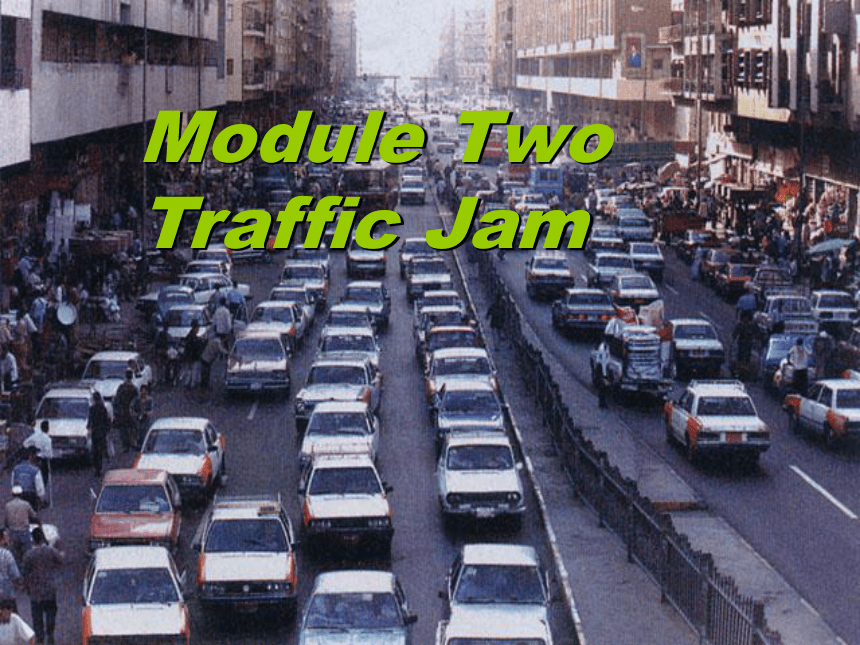 | |
| 格式 | zip | ||
| 文件大小 | 1.8MB | ||
| 资源类型 | 教案 | ||
| 版本资源 | 外研版 | ||
| 科目 | 英语 | ||
| 更新时间 | 2019-08-19 21:07:35 | ||
图片预览

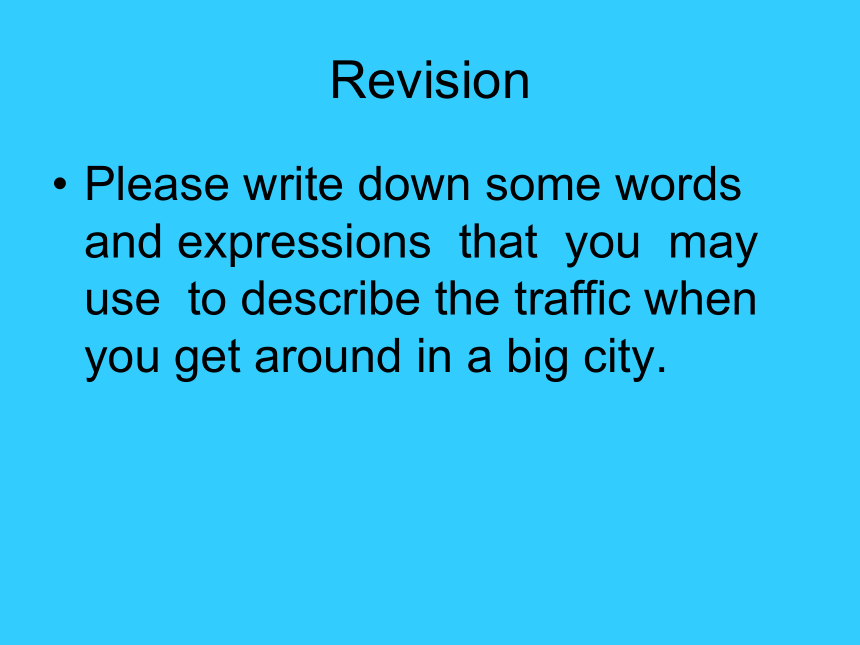
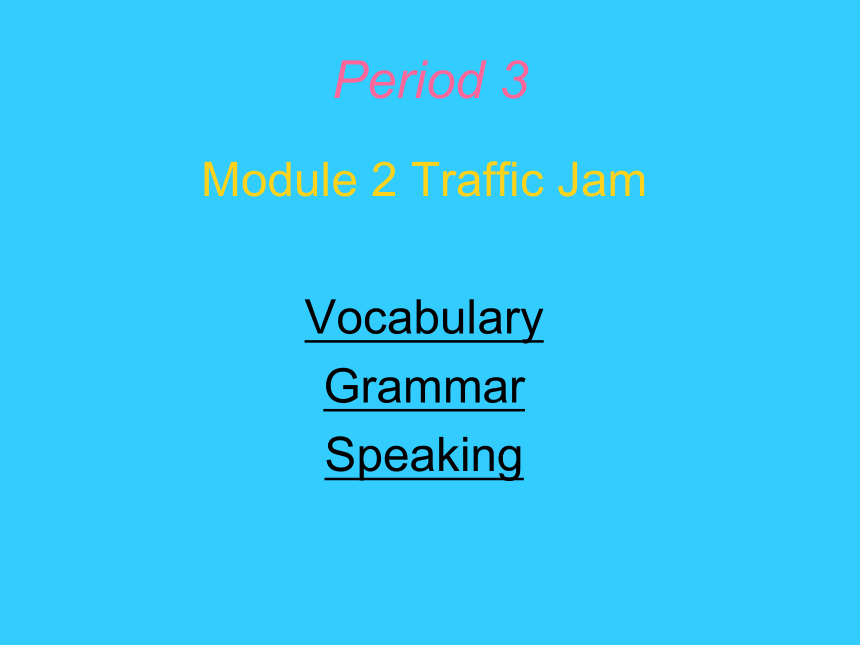
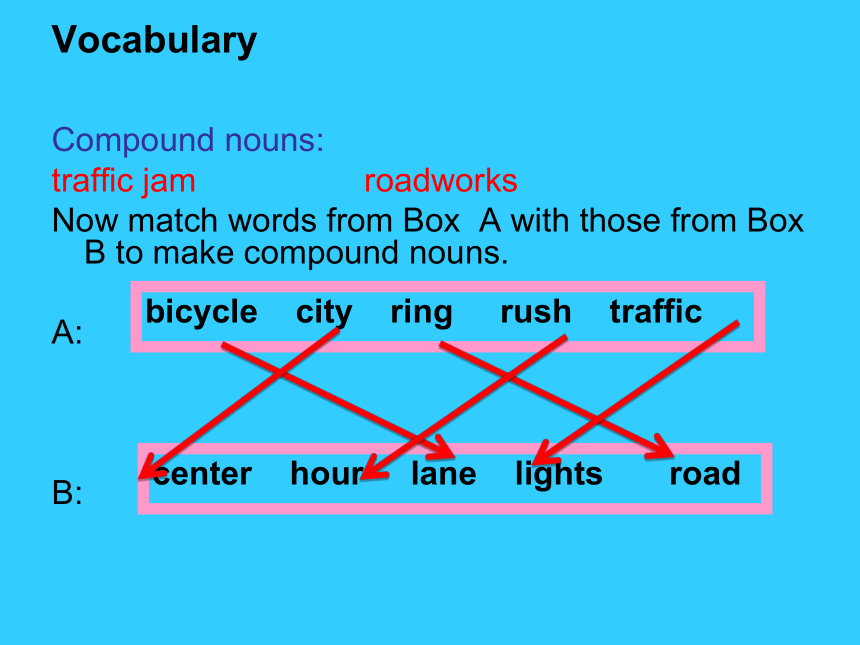
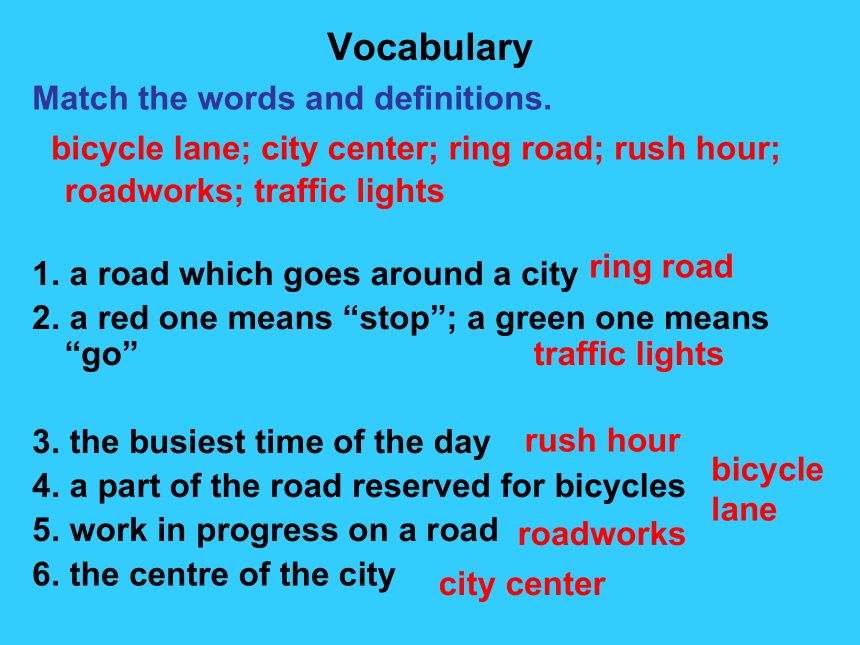
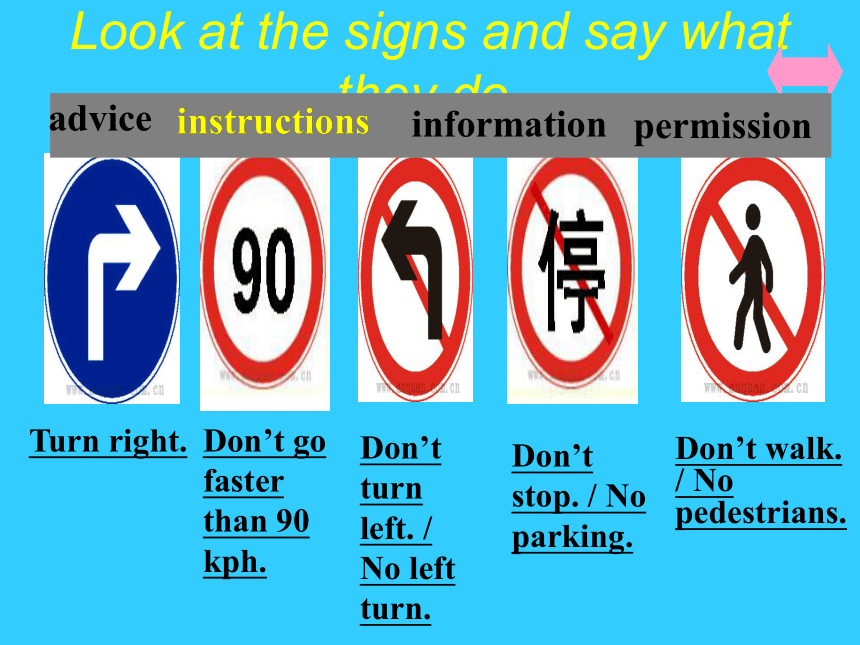
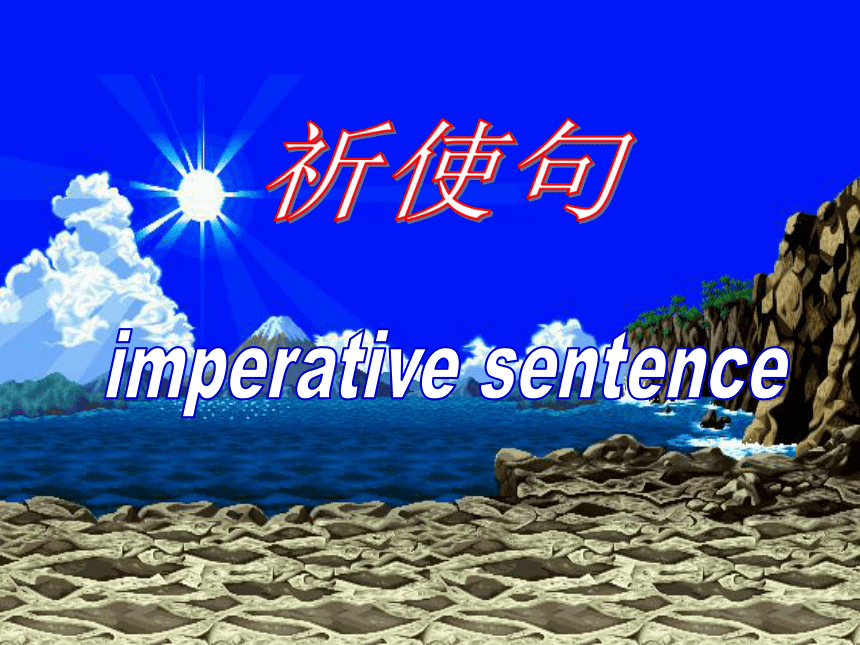
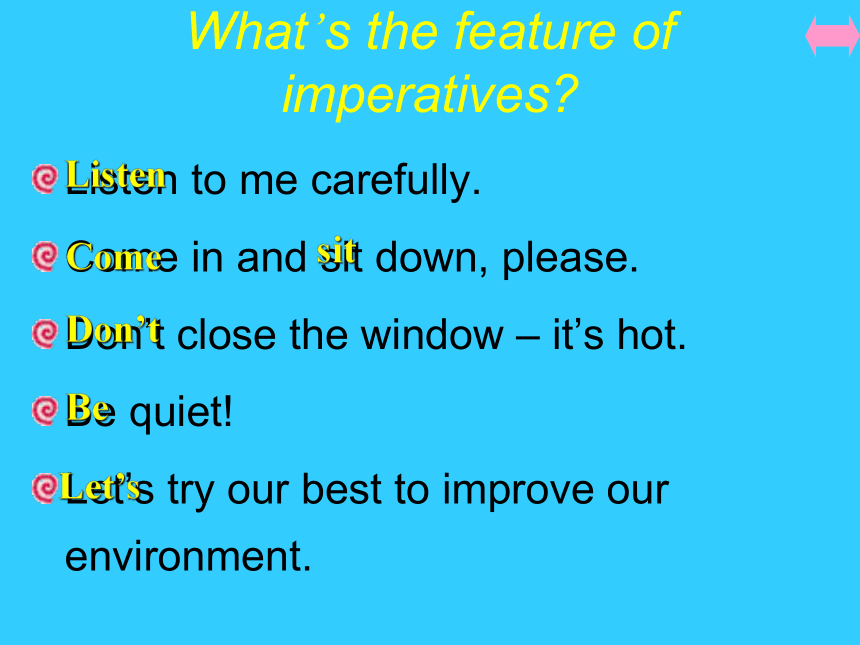
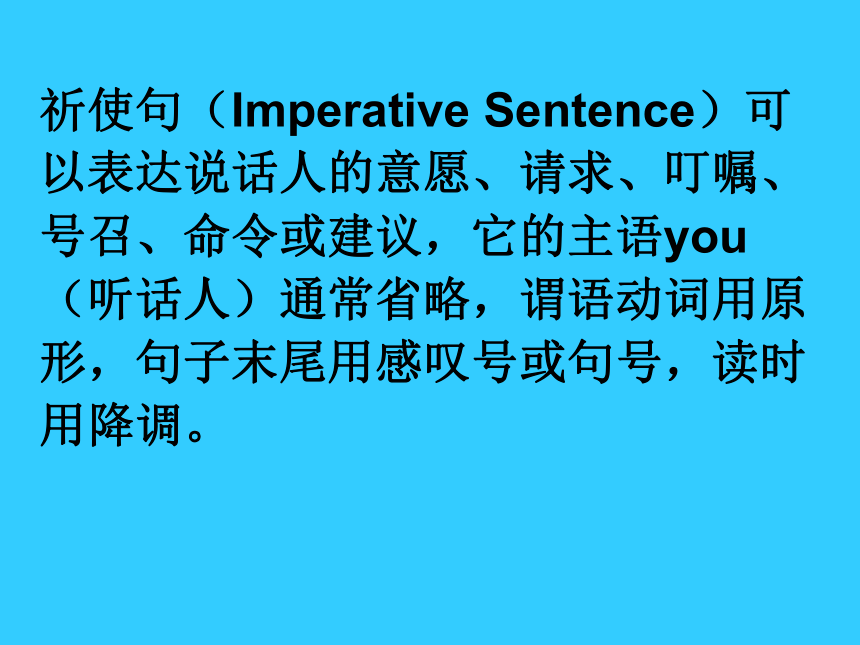
文档简介
课件27张PPT。Module Two
Traffic Jam
RevisionPlease write down some words and expressions that you may use to describe the traffic when you get around in a big city.Period 3Module 2 Traffic Jam
Vocabulary
Grammar
Speaking VocabularyCompound nouns:
traffic jam roadworks
Now match words from Box A with those from Box B to make compound nouns.
A:
B:
bicycle city ring rush trafficcenter hour lane lights roadVocabularyMatch the words and definitions.
bicycle lane; city center; ring road; rush hour; roadworks; traffic lights
1. a road which goes around a city
2. a red one means “stop”; a green one means “go”
3. the busiest time of the day
4. a part of the road reserved for bicycles
5. work in progress on a road
6. the centre of the cityring roadtraffic lightsrush hourbicycle laneroadworkscity centerGrammar-1. Look & Say (5ms) Look at the signs and say what they do. Turn right.Don’t go faster than 90 kph.Don’t turn left. / No left turn.Don’t stop. / No parking.Don’t walk. / No pedestrians.adviceinstructionspermissioninformationinstructions祈使句imperative sentenceGrammar-2. Observation (3m) What’s the feature of imperatives?Listen to me carefully.
Come in and sit down, please.
Don’t close the window – it’s hot.
Be quiet!
Let’s try our best to improve our environment.ListenComesitDon’tBeLet’s祈使句(Imperative Sentence)可以表达说话人的意愿、请求、叮嘱、号召、命令或建议,它的主语you (听话人)通常省略,谓语动词用原形,句子末尾用感叹号或句号,读时用降调。1. 祈使句的肯定形式 be型(系动词原形be+表语+其它)
Be careful! Don‘t go too high.
Be quiet, everyone!
2) do型(行为动词+宾语+其它)
Come in, please!
Please open your books!
3) let型(Let+宾语+动词原形+其它)
Let me have a look.
Let me help you. 1) be型(Don't+be+表语)
Don't be lazy!
Never be late again.
2) do型(Don‘t+行为动词原形+其它)
Don't throw the ball like that.
Don't worry. I'll soon be all right.
Never do it like that.
Don’t anybody say a word. 2.祈使句的否定形式3) let型有两种否定形式:
1) Let+宾语+not+动词原形+其它。
Let him not go there.
Let's not waste time.
2) Don‘t+let+宾语+动词原形+其它。
Don't let her go there.
Don't let the water run into the room.4) No+ v-ing/n. 表示禁止做某事No parking/smoking/admission!3. 祈使句的类型1). 不带主语的祈使句
Be careful next time!
Come and see me whenever it is convenient to you.2). 带主语的祈使句;
为了加强语气或指明同谁说话,可在动词前加上主语。加上主语时,由于是面对面说话并直呼其名,故不论第几人称,动词均用原形,不考虑主谓一致问题。Nobody move!
Mary come here —everybody else stay where you are.
You put on more clothes. It’s cold outside.3). (条件)祈使句+and/ or+ (结果)简单句
此句型为“条件与结果”并存的句式,其中的祈使句可转化为if条件句。1. Work hard and you will succeed.If you work hard, you will succeed.Working hard, you will succeed.2. Hurry up, or you will miss the last bus.If you don’t hurry up, you will miss the last bus.4).祈使句+附加信息;附加信息常表示发出祈使动作的原因Put on your coat, please—it’s very cold outside.
Turn down the TV set—the baby is asleep in the room.5).祈使句的反意疑问句Open the door, _________________?
Don’t forget, _________________?
Let’s go there at once, __________?
Let us go there, ______________?will you?/won’t youwill youshall wewill you6).祈使句的强调形式Do be patient!
Do sit down.
Do write back when you receive his letter.
加强祈使句语气的方式:
在谓语前+ doGrammar-5. Observation (5ms) Do you know how to make imperatives more polite? Open the window, please.
Will you go fishing with me this afternoon?
Would you do me a favor?
Could you show me how to get to the railway station?
Hand the dictionary to me, will you?
Let’s go out for a walk, shall we?
Why don’t you get something to drink?
I suggest we (should) take the train.
speaking1.Have you been stuck in a traffic jam, what did you feel?Task Page 17What should we do and what should we not do when stuck in a traffic jam?DosDon’tsSwitch off the motor.
Turn on the radio. Speak to your passengers. Follow the rules of the road.
Keep cool.Leave the motor on.
Blow your horn.
React when others drive badly.
Break the rules of the road.
Get angry.Finish the exercises on Activity 1 & 2 , on page 17. 1. Why not use / take underground?
2. Why not use minibus?
3. Why not travel at a different time?
4. Why not build new ones?
5. Why not employ more traffic policemen?
6. Why not build underground car parks?They are giving advice.Do you know how to give advice?You’d better (not) …
Why (not) …?
How / What about …?
Make sure that ….
Please don’t ….
You should always / never ….
You have to ….
Shall we / I …?
Let’s ….
It’s a good idea to …. Discussion
1.Talk about the traffic problems in our town.
2.Discuss ways of improving
the situation.
Begin with meHomework Review the grammar of this period.
Write a passage about the traffic problems in our town?
Traffic Jam
RevisionPlease write down some words and expressions that you may use to describe the traffic when you get around in a big city.Period 3Module 2 Traffic Jam
Vocabulary
Grammar
Speaking VocabularyCompound nouns:
traffic jam roadworks
Now match words from Box A with those from Box B to make compound nouns.
A:
B:
bicycle city ring rush trafficcenter hour lane lights roadVocabularyMatch the words and definitions.
bicycle lane; city center; ring road; rush hour; roadworks; traffic lights
1. a road which goes around a city
2. a red one means “stop”; a green one means “go”
3. the busiest time of the day
4. a part of the road reserved for bicycles
5. work in progress on a road
6. the centre of the cityring roadtraffic lightsrush hourbicycle laneroadworkscity centerGrammar-1. Look & Say (5ms) Look at the signs and say what they do. Turn right.Don’t go faster than 90 kph.Don’t turn left. / No left turn.Don’t stop. / No parking.Don’t walk. / No pedestrians.adviceinstructionspermissioninformationinstructions祈使句imperative sentenceGrammar-2. Observation (3m) What’s the feature of imperatives?Listen to me carefully.
Come in and sit down, please.
Don’t close the window – it’s hot.
Be quiet!
Let’s try our best to improve our environment.ListenComesitDon’tBeLet’s祈使句(Imperative Sentence)可以表达说话人的意愿、请求、叮嘱、号召、命令或建议,它的主语you (听话人)通常省略,谓语动词用原形,句子末尾用感叹号或句号,读时用降调。1. 祈使句的肯定形式 be型(系动词原形be+表语+其它)
Be careful! Don‘t go too high.
Be quiet, everyone!
2) do型(行为动词+宾语+其它)
Come in, please!
Please open your books!
3) let型(Let+宾语+动词原形+其它)
Let me have a look.
Let me help you. 1) be型(Don't+be+表语)
Don't be lazy!
Never be late again.
2) do型(Don‘t+行为动词原形+其它)
Don't throw the ball like that.
Don't worry. I'll soon be all right.
Never do it like that.
Don’t anybody say a word. 2.祈使句的否定形式3) let型有两种否定形式:
1) Let+宾语+not+动词原形+其它。
Let him not go there.
Let's not waste time.
2) Don‘t+let+宾语+动词原形+其它。
Don't let her go there.
Don't let the water run into the room.4) No+ v-ing/n. 表示禁止做某事No parking/smoking/admission!3. 祈使句的类型1). 不带主语的祈使句
Be careful next time!
Come and see me whenever it is convenient to you.2). 带主语的祈使句;
为了加强语气或指明同谁说话,可在动词前加上主语。加上主语时,由于是面对面说话并直呼其名,故不论第几人称,动词均用原形,不考虑主谓一致问题。Nobody move!
Mary come here —everybody else stay where you are.
You put on more clothes. It’s cold outside.3). (条件)祈使句+and/ or+ (结果)简单句
此句型为“条件与结果”并存的句式,其中的祈使句可转化为if条件句。1. Work hard and you will succeed.If you work hard, you will succeed.Working hard, you will succeed.2. Hurry up, or you will miss the last bus.If you don’t hurry up, you will miss the last bus.4).祈使句+附加信息;附加信息常表示发出祈使动作的原因Put on your coat, please—it’s very cold outside.
Turn down the TV set—the baby is asleep in the room.5).祈使句的反意疑问句Open the door, _________________?
Don’t forget, _________________?
Let’s go there at once, __________?
Let us go there, ______________?will you?/won’t youwill youshall wewill you6).祈使句的强调形式Do be patient!
Do sit down.
Do write back when you receive his letter.
加强祈使句语气的方式:
在谓语前+ doGrammar-5. Observation (5ms) Do you know how to make imperatives more polite? Open the window, please.
Will you go fishing with me this afternoon?
Would you do me a favor?
Could you show me how to get to the railway station?
Hand the dictionary to me, will you?
Let’s go out for a walk, shall we?
Why don’t you get something to drink?
I suggest we (should) take the train.
speaking1.Have you been stuck in a traffic jam, what did you feel?Task Page 17What should we do and what should we not do when stuck in a traffic jam?DosDon’tsSwitch off the motor.
Turn on the radio. Speak to your passengers. Follow the rules of the road.
Keep cool.Leave the motor on.
Blow your horn.
React when others drive badly.
Break the rules of the road.
Get angry.Finish the exercises on Activity 1 & 2 , on page 17. 1. Why not use / take underground?
2. Why not use minibus?
3. Why not travel at a different time?
4. Why not build new ones?
5. Why not employ more traffic policemen?
6. Why not build underground car parks?They are giving advice.Do you know how to give advice?You’d better (not) …
Why (not) …?
How / What about …?
Make sure that ….
Please don’t ….
You should always / never ….
You have to ….
Shall we / I …?
Let’s ….
It’s a good idea to …. Discussion
1.Talk about the traffic problems in our town.
2.Discuss ways of improving
the situation.
Begin with meHomework Review the grammar of this period.
Write a passage about the traffic problems in our town?
